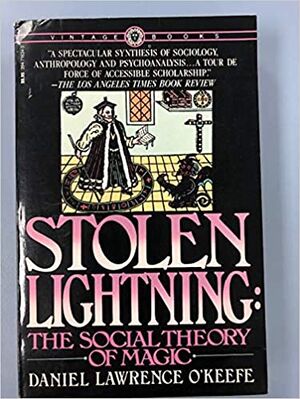Stolen Lightning (nonfiction): Difference between revisions
No edit summary |
No edit summary |
||
| Line 4: | Line 4: | ||
== Excerpts == | == Excerpts == | ||
=== Magic Fights Religion As Superego=== | |||
<blockquote> | |||
Wilhelm Stekel: Magic Fights Religion As Superego | |||
The idea that magic fights social pressure, superego, even religion, is more explicit in Stekel, especially in ''Compulsion and Doubt'', his study of the obsessional-compulsive neurosis. Many psychiatrists have found it natural to describe the spectacular symptoms of this neurosis in metaphors of magic. Harry Stack Sullivan alleged that the compulsive was once a child who had frightening and unpredictable parents and learned that he could "magically" control their behavior with words — ''up to a point''. Thus compulsives try to control events through word formulas — and hence the "doubt," because "it doesn't always work." | |||
</blockquote> | |||
pp. 275-276 | |||
Wilhelm Stekel (German: [ˈʃteːkəl]; 18 March 1868 – 25 June 1940) was an Austrian physician and psychologist, who became one of Sigmund Freud's earliest followers, and was once described as "Freud's most distinguished pupil".[1] According to Ernest Jones, "Stekel may be accorded the honour, together with Freud, of having founded the first psycho-analytic society"; while he also described him as "a naturally gifted psychologist with an unusual flair for detecting repressed material."[2] He later had a falling-out with Freud, who announced in November 1912 that "Stekel is going his own way".[3] His works are translated and published in many languages. | |||
* [https://en.wikipedia.org/wiki/Wilhelm_Stekel Wilhelm Stekel] @ Wikipedia | |||
=== Magic defends the self against society === | |||
<blockquote> | <blockquote> | ||
Revision as of 13:21, 11 November 2020

Stolen Lightning: The Social Theory of Magic is a book by Daniel Lawrence O'Keefe concerning the origins and development of magic, religion, and the individual.
Principles of magic
Excerpts
Magic Fights Religion As Superego
Wilhelm Stekel: Magic Fights Religion As Superego
The idea that magic fights social pressure, superego, even religion, is more explicit in Stekel, especially in Compulsion and Doubt, his study of the obsessional-compulsive neurosis. Many psychiatrists have found it natural to describe the spectacular symptoms of this neurosis in metaphors of magic. Harry Stack Sullivan alleged that the compulsive was once a child who had frightening and unpredictable parents and learned that he could "magically" control their behavior with words — up to a point. Thus compulsives try to control events through word formulas — and hence the "doubt," because "it doesn't always work."
pp. 275-276
Wilhelm Stekel (German: [ˈʃteːkəl]; 18 March 1868 – 25 June 1940) was an Austrian physician and psychologist, who became one of Sigmund Freud's earliest followers, and was once described as "Freud's most distinguished pupil".[1] According to Ernest Jones, "Stekel may be accorded the honour, together with Freud, of having founded the first psycho-analytic society"; while he also described him as "a naturally gifted psychologist with an unusual flair for detecting repressed material."[2] He later had a falling-out with Freud, who announced in November 1912 that "Stekel is going his own way".[3] His works are translated and published in many languages.
- Wilhelm Stekel @ Wikipedia
Magic defends the self against society
My deduction: Magic defends the self against society.
What, then, is magic? if religion is the projection of the overwhelming power of the group, and if magic derives from religion, but sets itself up on a somewhat independent basis to help individuals, and is, at the same time, frequently reported to be hostile toward religion ... the is not the answer apparent? Magic is the expropriation of religious collective representations for individual or subgroup purposes — to enable the individual ego to resist psychic extinction or the subgroup to resist cognitive collapse. Therefore, magic must have something to do with the parturition of individual monads out of the collective whole, and with the separation of subgroups from it.
Reviews
A Los Angeles Times book review called this book "a spectacular synthesis of sociology, anthropology, and psychoanalysis ... a tour de force of accessible scholarship".
The New York Times Book Review said it is "a powerful explication of how deeply magic is embedded in society."
Commonweal classified it as "a potential classic".
In the News
Fiction cross-reference
Nonfiction cross-reference
External links
- Daniel O'Keefe (writer) @ Wikipedia